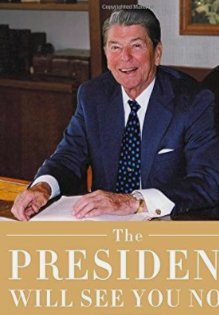Book Review: The President Will See You Now
/The President Will See You Now: A Memoir
by Peggy Grande
Hachette Books, 2017
President Ronald Reagan, now lionized and nearly-legendary, left office in 1989 and commenced the weird quasi-storefront post-administration life that has been the lot of US Presidents for the last 40 years. These men, who only weeks before were making executive decisions the affected millions, are suddenly private citizens again, and their idleness is rendered all the more conspicuous by the bright-spotlight intensity of their former job.
They make speeches. They found their presidential libraries, even if such a prospect is decidedly out of character, as in the case of George W. Bush, or the set-up to a string of caustic jokes, as in the case of Richard Nixon. They collect consulting fees. They attend state funerals. They do charity work. They endow foundations. On some occasions they do the kind of unfettered humanitarian relief they were often prevented from doing by the trench-warfare politicking of their administration years. They usually refrain from commenting on their successors in office. They make no trouble for their Secret Service details. They write their memoirs. It's a calm, air-conditioned, suit-buttoned existence that seems very pointedly drained of drama, a time of aggressively making money and burnishing legacies. In the case of hardly any ex-president since Theodore Roosevelt has the post-presidency struck many historians or memoirists as fruitful material for book-length studies.
President Reagan's case is deepened and saddened by the fact that he was diagnosed with Alzheimer's in 1994, a diagnosis that raised many questions about exactly how long the President might have been exhibiting symptoms of the disease before his diagnosis made it official. After the diagnosis, even the slightly hollow career afterlife of a US President was increasingly denied to Reagan; the friendly meetings in his California offices, the courteous phone calls to world leaders past and present, the speeches to usually-warm receptions – these and other things gradually drifted out of the man's reach, and his closest employees entered the gray zone between professional and personal, between worker and caregiver.
It's all the more amazing, then, in a low-key and deeply touching way, that author Peggy Grande has been able to transform this exact period of President Reagan's life into a tale very much worth reading. Grande's new book, The President Will See You Now, is a chronicle of her time working for Reagan from 1989 to 1999, and at first glance, the book seems to offer exactly the kind of antiseptic, make-work atmosphere that should freeze readability to a complete standstill:
The office was formal, and we were all conscious of maintaining that tone. Although the staff had warm, fun-loving friendships, office business was conducted in a polite, professional manner: hushed, respectful tones of conversation; no music playing during office hours; and no eating at your desk when visitors were on the floor. Desks needed to be kept tidy (or quickly made tidy) at all times. I often had to stash projects that were overflowing my desk to the “basement” under my desk until after the president left the office for the day. Then I would haul everything back up to my desktop to get through it all before I left.
But Grande is exactly the kind of sunny storyteller that, in fact, Reagan himself was; she takes her readers inside that tidy, formal work atmosphere of the California office and recounts all the best stories from her years there, workplace antics of a universally recognizable kind that are here given a slightly greater vibrational frequency by the fact that world figures like former Soviet premiere Mikhail Gorbachev can make appearances. Nancy Reagan, an easy target for vilification both during the administration years and after, is throughout these pages shown in her more human registers, fussing over her husband and caring for his public image but also showing glints of humor and care to the whole staff. And the symbiotic relationship between Grande and her boss becomes a smoothly-working thing over time, with procedures in place to brief the former president about the identities of his frequent visitors:
Prepared in this way, the president was free to greet each guest as a friend. When I entered his office with a first-time visitor it was wonderful to experience him as if for the first time again and again. I remembered how it felt when he approached me, looked me in the eye, and shook my hand that first day in the lobby. This legend, who had loomed so huge in my imagination, was suddenly before me … He was even more charming, more handsome, and more gracious than imagined. He was a man who genuinely delighted in meeting new people and had a way of making everyone feel as though they were important to him – because they were.
By rights, this kind of partisan enthusiasm ought to make The President Will See You Now an unbearably treacly affair, and maybe some readers will find it so. But the warm glow of Grande's memories suffuses these pages, and the book fills a lacunae in Reagan's long public life. The closing segment is heartbreaking and comes to concentrate on exactly the things all twilight-years memoirs reach eventually: short, delicate visits, hushed prognoses, bedsides.“He had given me a future I could never imagine,” Grande writes simply, “and had done so without even meaning to.” She's returned the favor with a charming, sad tribute.

